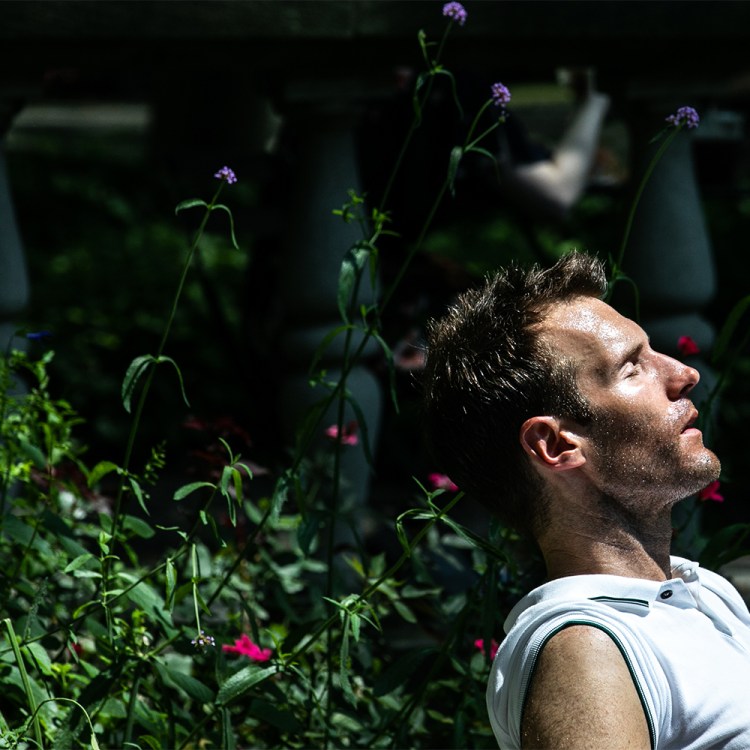Welcome to Cloud 9, our recurring series exploring what happiness really means — one person, and nine questions, at a time.
Jonathan Leary is the founder and CEO of Remedy Place, a social wellness club with two locations in New York City, one in Los Angeles and a brand-new Boston facility that opened this spring.
Contrast therapy experiences — in which practitioners intersperse cold plunges with sauna sessions — have spread like wildfire over the last few years, but Remedy Place was at the forefront, opening in New York’s Flatiron neighborhood in the summer of 2022.
Leary’s club promised an elevated experience from the outset, offering the usual wellness fare alongside more novel remedies like hyperbaric chambers, vitamin drips and lymphatic compressions. At the time, this stuff was familiar to supermodels and elite athletes, but still foreign to most longevity-curious consumers. Remedy Place packaged it masterfully. Leary’s studios are dark, elegant, anachronistic. They compel presence of mind and human connection.
We caught up with Leary to talk about how he made recovery cool — and the path that led him here. Below, the CEO reflects on ice baths, the power of friends and why well-being and success go hand in hand.
1. Where do you most commonly find happiness in your daily routine?
For me, happiness is deeply rooted in human connection. I find it in my core group of friends who inspire, motivate and support me every day. These relationships are incredibly important, and I invest time and energy into nurturing them and making sure they feel the same. Additionally, I find joy in meeting new and extraordinary people through my work at Remedy Place.
Another key element of my happiness is routine. I adhere to a consistent self-care routine and follow a sleep-maximizing bedtime routine. Even the smallest details — like making my bed every morning or drinking 15 ounces of water before getting out of bed — contribute to my overall success, which I define as happiness and health.
All that said, the most important part of my daily routine is six minutes in the ice bath. Pushing my body to its limits and learning to stay focused in such an extreme environment brings me into a state of complete presence. I’ve found that my most innovative ideas and inspirations come to me in intense environments.
Finally, it fills me with so much joy and gratitude to begin and end my day with a view. Growing up, I had a vision board in my bathroom with a picture of a home overlooking a city. I dreamed that one day, that view would be mine. Now, living in both L.A. and N.Y.C., with incredible views, I’m reminded daily, every morning and every night, of that childhood dream and how grateful I am for where I am in life. It’s also a powerful reminder that we truly can manifest anything we want in life.
2. What sabotages your happiness?
The absence of everything that makes me happy above. If I lacked meaningful relationships to share life with and learn from, if I didn’t have routine or consistency, if I wasn’t active every day or skipped my self-care routines, it would undoubtedly affect my happiness.
I firmly believe that we control our perspectives on life and, consequently, our happiness. While we can’t control what happens to us, we can control our reactions and actions. By coming from a place of understanding — being proactive, working hard, being a good person, doing what we love, prioritizing our health — we set ourselves up for success. Do that, and nothing can truly sabotage your happiness.
It’s also crucial to recognize the importance of feeling all emotions, even the difficult ones like sadness or anger. Life is hard, and these emotions are part of the human experience. Embracing them, rather than suppressing them, and handling them in a healthy way is key to emotional success. Feeling these emotions fully allows us to feel alive and contributes to our overall success in truly being happy.
Can the “Flow State” Save Us From Distraction?
Coined by psychologist Mihaly Csikszentmihalyi, flow offers rare clarity. We asked athletes, chefs and musicians how they find it again and again — and how you can, too.3. What’s the most gratifying aspect of your work?
The realization that the dream I’ve had since 2012 has already come true. It’s incredibly surreal to see something I’ve worked on for so long not only become a reality but also be something I am deeply passionate about. I feel like this is my purpose here in life. What makes it even more fulfilling is knowing that this work is making a tangible impact — helping people feel better, offering a new and healthy way to socialize, fostering stronger relationships. Additionally, seeing how positively the world and the industry have responded to the company we’ve built — even inspiring others to create their own versions — is truly incredible.
4. How do you characterize the relationship between happiness and success?
It’s deeply rooted in health. The healthier I am, the more directly it correlates with both my happiness and success. By continually pushing myself to actively age — I’m aiming to look and feel better as I get older — along with challenging myself both personally and professionally, I find that I set the foundation for success in all areas of my life. Additionally, by looking at every aspect of my life and trying to find a way to make it healthier, I feel confident that the things that truly matter to me will be successful.
5. Is there someone in your life whose attitude or approach you try to emulate?
No, I believe that all the answers lie within each of us. While it’s important to be inspired by others and surround yourself with people you admire, it’s equally important not to try to follow someone else’s path or emulate their mood or attitude. Doing so can prevent you from authentically becoming who you’re meant to be. Each of us has our own uniqueness.
6. A piece of art that makes you happy:
The statue of a bust that I keep in my living room.
7. A meal:
A filet at Polo Bar in N.Y.C.
8. A place:
My home in Los Angeles.
9. A memory:
The vision board I had when I was a child.
Whether you’re looking to get into shape, or just get out of a funk, The Charge has got you covered. Sign up for our new wellness newsletter today.




















